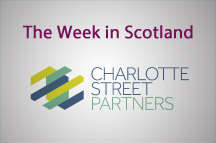 The party conference roadshow packed its bags once again and headed north to Glasgow last Sunday, this time for the gathering of Scotland’s party of government, the SNP. It was a rather subdued start to proceedings, with the ramifications of Theresa May’s spluttering performance in Manchester the previous week continuing to captivate the attention of the media, and Scotland being gripped by the once-unlikely prospect of an appearance at a football World Cup for the first time in two decades back firmly in our own hands.
The party conference roadshow packed its bags once again and headed north to Glasgow last Sunday, this time for the gathering of Scotland’s party of government, the SNP. It was a rather subdued start to proceedings, with the ramifications of Theresa May’s spluttering performance in Manchester the previous week continuing to captivate the attention of the media, and Scotland being gripped by the once-unlikely prospect of an appearance at a football World Cup for the first time in two decades back firmly in our own hands.
In the end, the result for the national team instead reminded us of our position as undisputed champions of the glorious failure, consigning the long-suffering Tartan Army to another two years in the footballing wilderness. However, their fortunes offer a useful parallel to the mood of the party faithful who converged in Scotland’s largest city.
After the First Minister’s speech in June in which she “reset” her timetable for a second referendum on independence, the SNP leadership and activists have had to come to terms with the reality that their ambitions for another vote anytime soon have been diminished. Save for a speech from Mhairi Black, who further endeared herself to the party membership with her declaration that independence should always be front and centre of the party’s campaigning, the crowd were limited to getting their dose of referendum discussion in the form of the ongoing situation in Catalonia. To be fair, judging by the number of Catalan flags in the conference arena over the weekend, the majority of members appeared only too happy to indulge.
 Perhaps then, as a consequence of the issue over independence no longer dominating the agenda, the conference was rather policy-heavy which followed a similarly weighty Programme for Government last month.
Perhaps then, as a consequence of the issue over independence no longer dominating the agenda, the conference was rather policy-heavy which followed a similarly weighty Programme for Government last month.
For many supporters in the room, listening to Nicola Sturgeon deliver her keynote speech may have felt more anti-climactic than in previous years. Little was mentioned about the ‘I’ word, and Brexit appeared less frequently than might have been expected given the UK government’s internal wrangling over the issue.
However, what the First Minister couldn’t be accused of was playing it safe as she reeled off a number of bold, radical policies to the delight of her audience. The most eye-catching was undoubtedly the pledge to establish a publicly-owned, not-for-profit energy company by the end of the current Scottish Parliament term in 2021. Having lost 21 seats in June’s general election, the First Minister’s offering appears to be an attempt to re-affirm her party’s position as the main left of centre party in Scotland against the challenge of Corbynism - while at the same time showing that Scotland is welcome to business, trade and migration.
There were a number of other policies that were kept back from the Programme for Government. Twenty thousand pound bursaries to incentivise people to change career by going into teaching was announced by Education Secretary John Swinney, a commitment to double spending on early-years childcare to £840m by 2020 was labelled as "truly transformational" by Nicola Sturgeon, and a further promise to scrap the 1% public sector pay cap in Scotland was met with rapturous applause.
This conference felt like a watershed moment for the party. With the prospect of a second referendum taking place before we leave the EU all but gone, the message appears to be one of patience. If they are to secure the margin of victory in the next election in 2021 that another referendum will require, they need to be seen to be doing the “day job”, and doing it well. It is no coincidence that the word “Progress” was emblazoned across the podium in the main stage of the auditorium. Proving to the electorate that they remain the most credible custodians when it comes to delivering a fair, inclusive, prosperous country is the First Minister’s primary objective.
In the meantime, for those impatient for another vote, us Scotland football fans could offer a word or two of wisdom when it comes to playing the long game.














